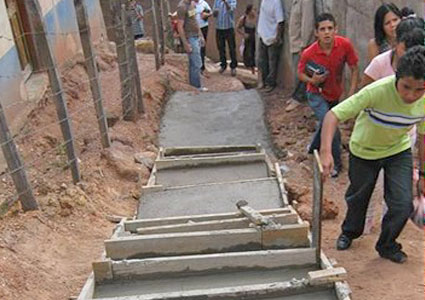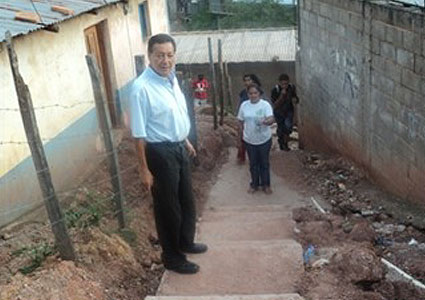“Ana would hit and insult other children. She was always looking for a fight,” says Irene Zepeda de Murillo, who represents CRWRC in their work with partners in Honduras. Persistent love and a consistent environment offered by the Youth Impact Club created not only structure and learning opportunities, but provided a foundation of compassion and hope; eventually Ana was won over. Suddenly, there was an alternative to violent street life and a grim future.
|
|
Ana* arrived at the Youth Impact Club (YIC) in Tegucigalpa, Honduras just over a year ago. At sixteen she was an aggressive and rebellious youth hardened by the relentless oppression of domestic violence and poverty.
“Ana would hit and insult other children. She was always looking for a fight,” says Irene Zepeda de Murillo, who represents CRWRC in their work with partners in Honduras.
Persistent love and a consistent environment offered by the Youth Impact Club created not only structure and learning opportunities, but provided a foundation of compassion and hope; eventually Ana was won over. Suddenly, there was an alternative to violent street life and a grim future.
“After a year and a half, her behavior has completely changed,” says de Murillo. “She is now hardworking, and she participated in the printing workshop. She has completed her primary education and is ready to continue into secondary school. She has told us that she would like to take a course in a technical trade to enable her to find work, while also continuing her academic education.“
The young woman is now the club’s president, and leadership has already started to train her to lead a new club in the community in the future.
This is just one of many stories of lives changed and futures forever altered through the YICs.
Association for a More Just Society (ASJ), a partner of CRWRC in Honduras, has been working with youth at risk for a little more than two years, and there are 183 youth involved in nine clubs in Tegucigalpa.
Intervening in the lives of youth who are on a potentially devastating path is a key priority for CRWRC in Honduras; the country, along with neighboring El Salvador, has the highest homicide rate in the world, according to a recent United Nations report.
The 2011 Global Study on Homicide blamed drugs and organized crime for the majority of violence, and on average, there are around 15 murders every day in a country with a population of about 7.5 million.
“We are involved in several justice projects in Honduras including partnering to provide legal and psychological clinics for those who would not typically have access to these services. Youth are definitely a focus for us as well,” says CRWRC Latin America Team Leader Leanne Talen Geisterfer. “There is a generation of youth here growing up in a violent context, and we need to act now to prevent that from changing who they become.”
Mentors or leaders in the YICs are youth who are trained on the Kaizen methodology.
“This methodology has been proven to be successful in teaching youth about values such as honesty, friendship, confidence, love, self-esteem, respect, companionship, team work and obedience,” says de Murillo. “In addition, youth are being trained in matters such as the consequences of drug use, and sexually transmitted diseases. Youth are also engaged in English, computers, bakery and beauty courses.”
YIC members also work on community projects together. These efforts include building stairways along steep and slippery slopes where people might otherwise fall, painting community centres and organizing community clean-up projects.
Youth have collected and distributed clothing and toys to give to impoverished children in their community living in poverty, and participated in tutoring children with learning problems.
The YIC members have even built drainage ditches to prevent homes from flooding and have constructed “pilas” (water containers) to help improve homes.
“The clubs make a difference in the lives of youth by helping them develop values, spiritual growth, build skills and love for others and their community,” says de Murillo. “The ultimate goal of the program is to provide young people with opportunities to have a better life and become community leaders, so they can be mentors and form new clubs to reach and help other young people at risk.”
*name has been changed to protect the identity of a minor


